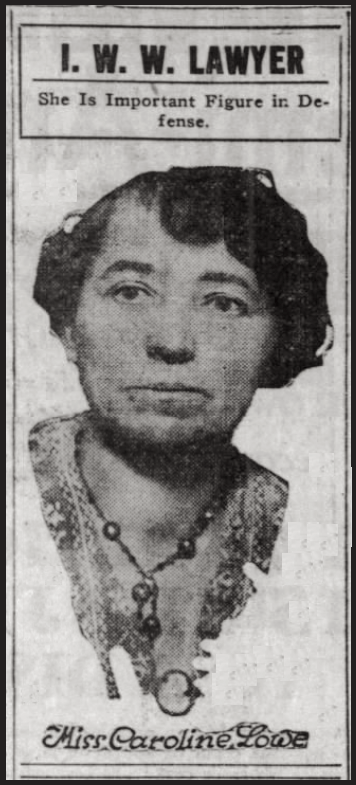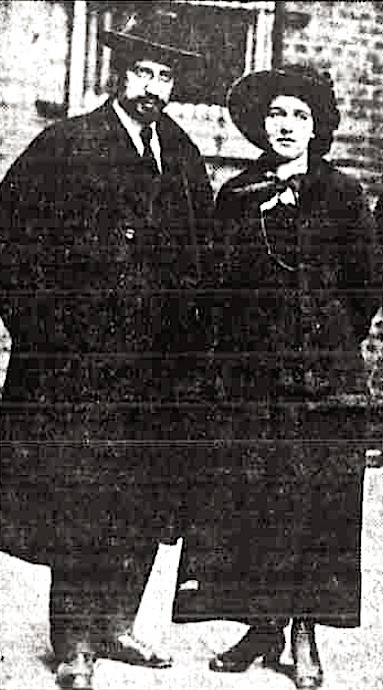It’s great to fight for freedom
With a Rebel Girl.
-Joe Hill
Hellraisers Journal, Wednesday February 20, 1918
New York, New York – Elizabeth Gurley Flynn Free on $25,000 Bond
In searching for the recent doings of Elizabeth Gurley Flynn, we found her in the pages of the Chicago Tribune where we learned that she has posted $25,000 bond in the court of Federal Judge Landis. We next found her in New York City, where, according to the Buffalo New Age, she attended a lecture by Robert Bruere, one of the few defenders of the Industrial Workers of the World.
From The Chicago Daily Tribune of February 4, 1918:
I.W.W. LAWYERS READY TO
BEGIN DEFENSE TODAY
—–
Will Ask Landis to Quash Indictments
and Return Seized Papers.
—–
Attorneys for the 116 alleged members of the I. W. W., already under arrest, will open their first great offensive today. They have been laying their plans for weeks.
They are to appear before Federal Judge Landis and ask demurers, make mentions to quash the indictments, and demand the return of all documents in possession of the government by attacking the writs under which the seizures of evidence were made.
Array of Legal Talent.
Charles E. Whiteside of New York, who represents a little coterie of indicted ones, including Elizabeth Gurley Flynn, alleged author of a book on “Sabotage”; Joe Ettor of Lawrence strike fame, and Arturo Giovanetti, will ask a severance for his clients. He arrived last night. These three on almost an instant’s notice produced cash bond of $25,000 each.
Prominent in the defense of the other I. W. W. members will be Miss Caroline Lowe of Seattle, a Socialist author. She is credited with having one of the keenest minds among the legal forces of the organization. George [F.] Vanderveer, also of Seattle, will lead in the fight…
From the Buffalo New Age of February 9, 1918:
Employers, Not “Wobblies”, Real
Lawbreakers and Anarchists
—–BRUERE AND WARD, WHO HAVE FOLLOWED THE TRAIL
OF THE I. W. W. FOR YEARS, TELL OF HISTORY
AND PERSECUTION OF ORGANIZATION
OF MIGRATORY WORKERS.
—–
“Following the Trail of the I. W. W.” proved very interesting to an audience that packed the hall in the Greenwich House, 29 Barrow street, to pursue that journey. The guides of the trip were Robert W. Bruere, who wrote a notable series of articles on the I. W. W. for the Evening Post, and Professor Harry Ward of the Boston University Theological Seminary and the Union Theological Seminary.
Disclaiming any partisanship, Bruere told simply the facts of the I. W. W. movement, and the conditions which generated it, as he had observed them in his trip through the copper mining territory. Professor Ward, who had been “following the trail of the I. W. W. for five years,” assumed a more partisan attitude toward the syndicalist idea in his discussion. He, too, presented facts which he had seen, which bear out Bruere’s contention that the employers, rather than the industrial workers, are the real lawbreakers and anarchists of the mining sections.
“When you go into the copper mining districts,” Bruere told the audience, “you understand why the I. W. W. originated and why it spread, particularly among the migratory workers. You have on one hand the mines, watched over by the operators, and on the other side, the underground miner, who is usually migratory.
NO MIDDLE CLASS.
“There is no middle class; there is only a small group controlling the property and the large group which considers itself the exploited group.”
He narrated the openness of this class struggle, saying that stores, churches, newspapers, etc., are all owned by one group or the other, the exploiters controlling the majority, of course. An illuminating incident he related showed how the bishop of a certain sect, who desired to build a church in a particular town, was forced to agree that the management of the mine controlling the town should have absolute supervision of the pulpit. The point, as Bruere made it, was that this was a commonplace proceeding in the mining territories.
Referring to the large number of aliens employed in the mines, Bruere said that originally the work there had been done by American-born workers, “but there was a limit to the amount of exploitation they would stand for.”
“A system of espionage which would do credit to the German government exists in the mining camps,” he declared. “Hundreds of thousands of men have been brought over here from Europe and treated in a way they had every reason to believe impossible in America,” he continued, referred to the fact that employers dodged the contract labor law by subterfuges.
At another point he told how a district superintendent of railroads in the West told him that “the people back East judge only by the balance sheet” in explaining why the exploitation goes on.
The speaker related various outrages on part of bosses, “liberty committees.” etc. He said that no proof of “sabotage” on the part of the I. W. W. has ever been produced, and added that members of the I. W. W. had saved the national forests from a great fire. They have been accused of firing these very forests!
Professor Ward declared that the present attitude toward the industrial workers “doesn’t mean that democracy has broken down in wartime; it means that it has never arrived.” Bisbee was only the culmination of a long series of outrages, he went on; the I. W. W. were denied their rights as citizens continually.
A study of the history of the past six months showed that the world was leaning more and more to the syndicalist idea, he asserted, pointing to the attitude of the English Labor Party to bear out his contention.
Declaring that any state of society must “have a place for the revolutionary society,” he turned to conditions in America and said:
“There is more of the right of public discussion of war aims and peace aims in Germany than in the United States. That isn’t because Germany has more democracy than the United States, but simply because Germany has gotten over the romantic spirit of the first year of war.”
His investigations, he continued, had shown to him how ridiculous the charge of German money being paid to members of the I. W. W. was.
“The I. W. W. takes the place of the devil out West,” he said.
Referring to the indictments against the I. W. W., he declared: “That indictment it utterly unworthy of the United States government.”
George F. Vanderveer, attorney for the industrial workers, also spoke. Among the audience were Helen Keller, Elizabeth Gurley flynn, Carlo Tresca, and Joseph J. Ettor. The meeting, which was held under the auspices of the New York chapter of the Inter-collegiate Socialist society, was presided over by Harry Laidler.-New York Call.
———-
[Photograph added.]
SOURCES
The Chicago Daily Tribune
(Chicago, Illinois)
-Feb 4, 1918
https://www.newspapers.com/image/354980267/
The New Age
(Buffalo, New York)
-Feb 9, 1918
https://www.newspapers.com/image/354187503/
IMAGES
WWIR, Caroline Lowe IWW Lawyer, Chg Tb p13, Feb 4, 1918
https://www.newspapers.com/image/354980267/
Paterson Silk Strike, Tresca EGF, NY Sun p41, Aug 12, 1917
http://chroniclingamerica.loc.gov/lccn/sn83030431/1917-08-12/ed-1/seq-41/
See also:
Caroline Lowe (1874-1933)
https://en.wikipedia.org/wiki/Caroline_Lowe
Hellraisers Journal, Tuesday February 20, 1917
Seattle, Washington – Caroline A. Lowe Joins Defense Team
Everett Defense News Letter No. 12: Caroline A. Lowe Comes to Aid of Class-War Prisoners
Following the Trail of the I. W. W.
-by Robert W. Bruere
Reprint from:
The New York Evening Post, 1918
https://books.google.com/books?id=oR0iAQAAIAAJ
The Nation, Volume 106
From The Nation of Feb 21, 1918
(search: “copper camp patriotism” bruere)
https://books.google.com/books?id=3Gc6AQAAMAAJ
Rebel Voices
-ed by Joyce L. Kornbluh
PM Press, Sep 1, 2011
(search: bruere)
https://books.google.com/books?id=n2ATBwAAQBAJ
Greenwich House
http://www.greenwichhouse.org/
History
http://www.greenwichhouse.org/about/history



